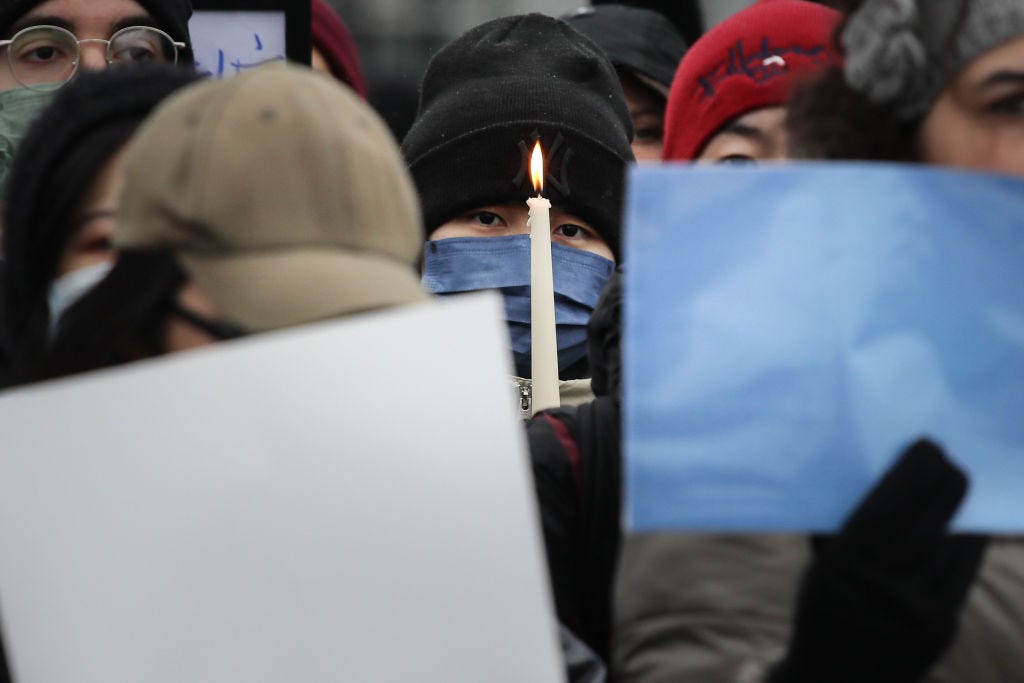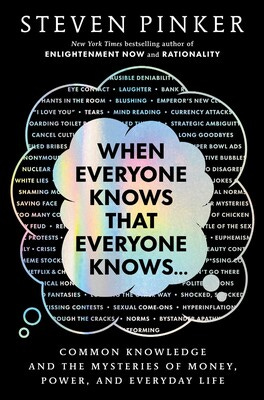Why Authoritarians Fear Common Knowledge
An excerpt from Steven Pinker’s new book “When Everyone Knows That Everyone Knows…”

When the little boy said the emperor was naked, he wasn’t telling anyone anything they didn’t already know. But he added to their knowledge nonetheless. By blurting out what every onlooker could see within earshot of the others, he ensured that they now knew that everyone else knew what they knew, that everyone knew that everyone knew that, and so on. And that changed their relationship to the emperor, from obsequious deference to ridicule and scorn.
Hans Christian Andersen’s immortal story draws on a momentous logical distinction. With private knowledge, person A knows something, and person B knows it. With common knowledge, A knows something, and B knows it, but in addition, A knows that B knows it, and B knows that A knows it. On top of that, A knows that B knows that A knows it, and B knows that A knows that B knows it, and so on, ad infinitum.
“The Emperor’s New Clothes” dramatizes two features of common knowledge that make it not just a mind-blowing logical concept but a key to understanding human social life. One is that common knowledge need not be deduced from an infinite chain of musings about other people’s mental states (“I know that you know that I know that you know...”), which no mortal could ever think. It can be instantly imparted by a conspicuous event, like a plain sentence uttered in public.
The other is that the difference between private knowledge, even when widely shared, and common knowledge is not a mere logical nicety. It can unify knowers in coordinated action and sometimes explode a social status quo.
One of the best jokes from the vein of subversive humor in the Soviet Union has a man standing in the Moscow train station handing out leaflets to passersby. Soon enough the KGB arrest him, only to discover that the leaflets are blank sheets of paper. “What is the meaning of this?” they demand. The man replies, “What is there to write? It’s so obvious!” The point of the joke is that the pamphleteer was generating common knowledge.
Everyone knew that the communist regime was inefficient and oppressive, but they could not have been sure that everyone else had come to that conclusion. A man in a public place calling attention to the existence of reasons for discontent was making that discontent known, and the awareness of it known, even if he didn’t need to make the reasons themselves known.
The man’s arrest—and more generally, the repression of speech, the press, and assembly in autocracies—raises the question of why dictators find the expression of opinions so terrifying. After all, one could imagine that dictators would allow their powerless subjects to bitch and moan all they wanted. Political power, wrote Mao Zedong, “grows out of the barrel of a gun.”
In reality there is an excellent reason why dictators brook no dissent. The immiserated subjects of a tyrannical regime are not deluded into thinking that they are happy. And if tens of millions of disaffected citizens act together, no regime on earth has the brute force to resist them. The reason that citizens don’t resist their overlords en masse is that they lack the prerequisite to coordinating their behavior for mutual benefit, namely common knowledge.
Most citizens may be concealing their political opinions to avoid being punished, with the result that no one knows that a majority of their compatriots share their disgruntlement. They might even mistakenly think that everyone else is loyal to the regime—a combination of private knowledge and common misconception known as pluralistic ignorance, or a spiral of silence. And even if they did suspect their discontent was shared, they would have no reason to believe that others would express that discontent at the same time as they did, overwhelming the regime rather than exposing themselves to being picked off or locked up one at a time.
A demonstration in a public place, though, can generate the common knowledge needed to coordinate resistance. Each protester in a throng can not only see the others but see that the others are seeing the others. As the pluralistic ignorance unravels, the protest can snowball and take in a growing number of defectors who had been falsifying their loyalty. This allows all the protesters to coordinate their actions, whether by literally storming the palace or by bringing the state machinery to a halt through work stoppages and boycotts. As Gandhi told a British general in the eponymous 1982 movie, “In the end you will walk out. Because one hundred thousand Englishmen simply cannot control three hundred fifty million Indians if the Indians refuse to cooperate.”
Walk out they did. By the same dynamic, 150 other regimes in the twentieth and twenty-first centuries walked, ran, or scrambled in a panic from nonviolent but coordinated protesters. In the decades flanking the turn of the twenty-first century, these revolutions, often named after colors, plants, or soft fabrics, transformed the world. According to figures from the political scientist Erica Chenoweth, in the second half of the twentieth century nonviolent resistance movements overtook violent ones in number and enjoyed double their success rate (51 versus 25 percent), even when pitted against brutal dictatorships. (The trend is part of the long-term decline of violence I documented in The Better Angels of Our Nature.) An important accelerant has been the use of media that generate ever-wider networks of common knowledge, namely the photocopier, fax, internet, Web, and social media.
Chenoweth has found that in the past two decades the success rate of nonviolent civil resistance campaigns has started to decline (though they still outperform the violent ones). One reason is “the dictator’s learning curve”: autocrats have become cleverer at disrupting civil resistance campaigns, often by throttling social media. The most sophisticated is the government of China, which employs tens of thousands of censors to read every social media submission and take down the ones it deems dangerous. Tellingly, however, the dangerous posts are not ones criticizing the government. What the censors squelch is posts that might coordinate action: notices of protests, rallies, and grassroots movements, even if the author was criticizing them.
Dictators’ attempts to quash common knowledge have in turn inspired activists to think up ever more creative means of generating it, often by baiting the government to criminalize innocuous activities. The stunts include clapping hands, singing songs, opening umbrellas, wearing buckets on their heads, baring their breasts, setting their cell phones to ring simultaneously, tying flags to the tails of stray cats, performing sword fights, or frying eggs and sausages on the eternal flame of a war monument. (A satirical notice in Belarus reported, “A kindergarten teacher has been found guilty of fomenting disorder for teaching her charges how to play pattycake.”) And in a case of life imitating a joke, in 2022 Russian police arrested a woman for, yes, holding a blank sign.
A common saying in the Soviet era, sometimes attributed to Aleksandr Solzhenitsyn, was “We know they are lying. They know they are lying. They know that we know they are lying. We know that they know that we know they are lying. And still they continue to lie.” Perhaps they continued to lie because even three levels of mutual knowledge stopped short of the common knowledge that would have allowed the people to coordinate a challenge to the lies.
Steven Pinker is Johnstone Professor of Psychology at Harvard.
From WHEN EVERYONE KNOWS THAT EVERYONE KNOWS...: Common Knowledge and the Mysteries of Money, Power, and Everyday Life by Steven Pinker. Copyright © 2025 by Steven Pinker. Reprinted by permission of Scribner, an Imprint of Simon & Schuster, LLC.
Follow Persuasion on Twitter, LinkedIn, and YouTube to keep up with our latest articles, podcasts, and events, as well as updates from excellent writers across our network.
And, to receive pieces like this in your inbox and support our work, subscribe below:







Those of us who grew up admiring Solzhenitsyn and Havel long ago recognized how power survives solely through lies. Havel wrote in The Power of the Powerless “Obviously the greengrocer is indifferent to the semantic content of the slogan on exhibit; he does not put the slogan in his window from any personal desire to acquaint the public with the ideal it expresses. This, of course, does not mean that his action has no motive or significance at all, or that the slogan communicates nothing to anyone. The slogan is really a sign, and as such it contains a subliminal but very definite message. Verbally, it might be expressed this way: ‘ I the greengrocer XY, live here and I know what I must do. I behave in the manner expected of me. I can be depended upon and am beyond reproach. I am obedient and therefore I have the right to be left in peace.’ This message, of course, has an addressee: it is directed above, to the greengrocers superior, and at the same time it is a shield that protects the greengrocer from potential informers. The slogans, real meaning, therefore, is rooted firmly in the greengrocers existence.”
We have been faced with the combination of compelled speech and censorship for some time now. We regularly read surveys of college students who hide their beliefs while others readily admit that violence to compel/suppress expression is acceptable.
At work and in professional associations we are required or coerced to write ideological statements. It would be no surprise to either Solzhenitsyn or Havel that the more ridiculous the compelled speech is, the more effective it is. Naked emperors are all around us all of the time,
Excellent post, which echoes some people active in the current protest movement against authoritarian overreach. They've been encouraging us not only to dialogue with our friends, neighbors and acquaintances, but to use bumper stickers, yard signs, t-shirts, badges, and etc. to demonstrate to others that a lot of people know what's going on, and don't like it. (See discussions about this on the.Ink by Anand Giridharadas.